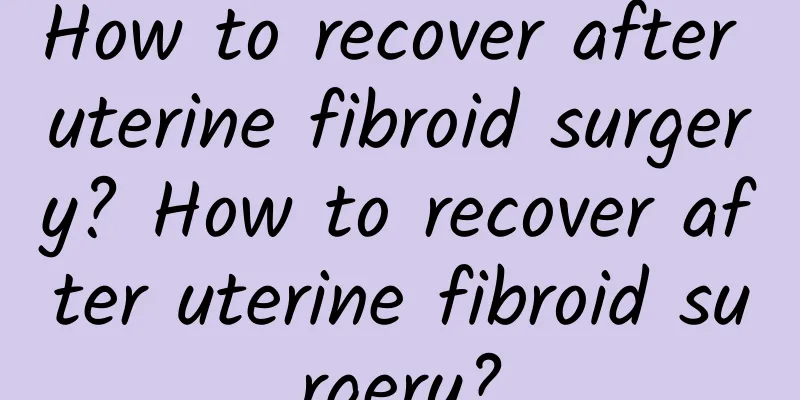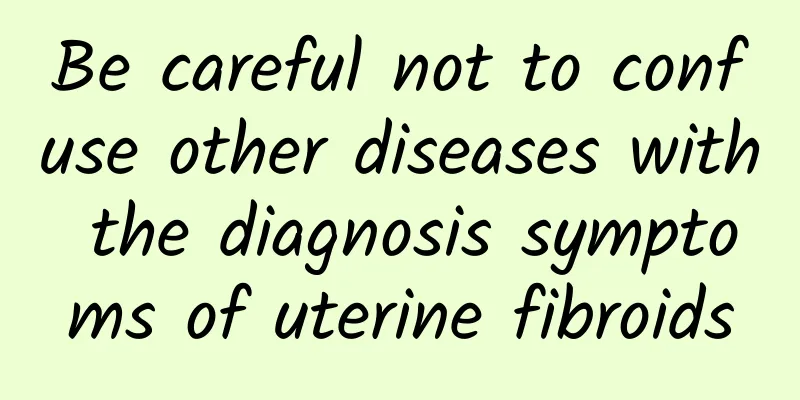How to recover after uterine fibroid surgery? How to recover after uterine fibroid surgery?

|
Uterine fibroids are common benign tumors of the female genitals, which have gradually increased in recent years. They seriously affect women's physical and mental health. How is the recovery after uterine fibroid surgery? Generally speaking, if you pay attention to conditioning after uterine fibroid surgery and cooperate with the doctor for regular checkups, the recovery effect will be good. Uterine fibroids Uterine fibroids are a benign clinical tumor. At present, there are a large number of female patients with uterine fibroids. The symptoms of female patients with uterine fibroids are not obvious in the early stage of the disease. Most female patients with uterine fibroids are accidentally discovered during gynecological examinations, so it is best for patients with symptoms to identify the cause in time for symptomatic treatment. Symptoms of uterine fibroids The main symptoms of uterine fibroids are: irregular menstruation, abdominal mass, compression symptoms, pain, increased leucorrhea, infertility, circulatory system symptoms, etc. In addition to the huge physical and mental harm caused by uterine fibroids themselves to most women, clinical practice has confirmed that uterine fibroids are often complicated by fallopian tube and ovarian lesions, and are also likely to coexist with uterine adenocarcinoma and cervical cancer. Causes of uterine fibroids According to traditional Chinese medicine, female uterine fibroids are caused by seven kinds of internal injuries, organ dysfunction, qi stagnation and blood stasis. Modern medical research has found that the estrogen receptor volume in fibroid tissue is larger than that in normal uterine fibroid tissue. It is suggested that the occurrence of female uterine fibroids is related to endocrine disorders caused by long-term excessive estrogen levels. At the same time, hormone metabolism is controlled by advanced nerve centers, so nerve center activity may also play a very important role in promoting female uterine fibroids. In addition, cytogenetic studies have shown that some fibroids have cytogenetic abnormalities. Postoperative treatment plan for uterine fibroids 1. After being diagnosed with uterine fibroids, you should go to the hospital for regular check-ups. If the fibroids grow slowly or not at all, you can have a check-up every six months; if they grow significantly, you should consider surgical treatment to avoid severe bleeding or compression of abdominal organs. 2. Avoid getting pregnant again. Women with uterine fibroids may not recover well after an artificial abortion, which often causes long-term bleeding or chronic genital inflammation. 3. If you have heavy menstrual bleeding, eat more iron-rich foods to prevent iron deficiency anemia. 4. Do not take too much estrogen after menopause to avoid the growth of uterine fibroids. 5.Myomectomy can be used to preserve fertility and for surgical treatment. 6. To prevent excessive fatigue, pay special attention to rest during menstruation. 7. Eat more vegetables and fruits and less spicy food. Keep the vulva clean and dry, and wear loose underwear. If there is too much vaginal discharge, wash the vulva at any time. |
Recommend
Experts explain the dietary principles that need to be followed after suffering from irregular menstruation
It is understood that many female friends suffer ...
Cryotherapy for cervical hypertrophy
What are the treatments for cervical hypertrophy?...
Adenomyosis care issues
What are the nursing issues for adenomyosis? 1. A...
Classification of causes of hyperprolactinemia
What are the types of hyperprolactinemia? Accordi...
How can you eat to avoid getting old and getting fat? Women aged 20 to 50 must read this guide
Everyone hopes that they can live to old age in g...
What is congenital cervical erosion
Cervical erosion refers to the shedding of the ep...
How many days does it take for menstruation to be clean after abortion? What details should be paid attention to after abortion?
After an abortion, the normal menstruation will b...
The dangers of uterine fibroids that everyone needs to know
The harm of uterine fibroids needs to be understo...
What are the common examination methods for vaginitis?
Vaginitis is a common disease among women. There ...
What does a full gynecological examination include?
The prevalence of gynecological diseases is now s...
What should I pay attention to during miscarriage? There are still many issues that need attention.
After a miscarriage, you need to pay attention to...
Why can't you eat bananas when you have uterine fibroids?
Why can't patients with uterine fibroids eat ...
What are the factors that affect the price of painless abortion?
The emergence of painless abortion has solved man...
Is ovarian cyst serious? What are the main symptoms?
Ovarian cysts are a type of ovarian tumor in a br...
Why is painless abortion painless?
Painless artificial abortion (abbreviated as pain...









